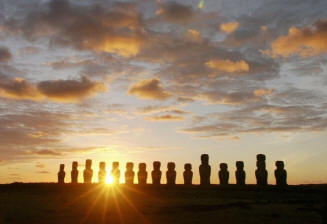EASTER
April 5, 2010
In The New Being Paul Tillich
wrote:
It is love, human and divine, which overcomes death . . .
Death is given power over everything finite, especially in our
period of history. But death is given no power over love. Love
is stronger. It creates something new out of the destruction
caused by death; it bears everything and overcomes everything.
It is at work where the power of death is strongest. . . . It
rescues life from death. It rescues each of us, for love is
stronger than death.
We thank the Rev. Brenda Bennett for
her distilled reflections on the meaning of the paradigmatic
events of Holy Week and Easter:
Gethsemane to Golgotha – the Moral Choice
 Our
Lenten pilgrimage has come to an end. We have been journeying
upward, companioning Jesus on his going up to Jerusalem. We have
also pursued an inward path – exploring our personal call, our
particular cross to be carried, our private grave to be
conquered.
Our
Lenten pilgrimage has come to an end. We have been journeying
upward, companioning Jesus on his going up to Jerusalem. We have
also pursued an inward path – exploring our personal call, our
particular cross to be carried, our private grave to be
conquered.
Jesus’ trek and ours have been undertaken in prayerful
parallel. In the final hours of the Passion drama, our separate
journeys intersect. Where they meet, moral choices must be made.
Am I a traitor or a protector? Do I keep watch or flee to sleep
or safety? Is my solidarity proclaimed or do I prefer a low
profile?
There is no morally neutral ground; a choice is forced. We
must either protect the innocent and the weak, the abused and
the oppressed or we are guilty of their betrayal. If we choose
not to stay alert to their needs then we have denied them our
presence and our prayers. We can claim them as kin or condemn
them to solitary suffering.
They – the disparaged, the disadvantaged and the
dispossessed – were why Jesus died. He promulgated their virtue
and their value to God; he included them, affirmed them and
appointed them his right-hand staff.
Jesus died because he proclaimed a new pathway to the
Divine. It was a Way actualized by providing for the needy,
protecting the welfare of children and promoting the rights and
roles of women. Jesus’ Way liberated people from the Law whilst
binding them to the principles of love. It was – and is – a Holy
highway, built on social justice rather than on systemic power.
During this week of solemn services and ceremonies, Jesus’
suffering and death are front and centre of Christian
observance. His courage and commitment fill us with admiration
and awe. Yet we feel compelled to minimize their importance. We
deem Jesus’ execution to be God’s will; we declare that this was
why Jesus was born; we decide that Jesus was ok with being an
innocent on death row.
Those are stands which protect us from following in path.
They are views which prevent us from fighting for the very goods
Jesus died to promote. They make for good doctrine but bad
discipleship.
Kierkegaard reminds us that neither feel-good sentiment
nor fiery dogma are options for the true follower of Jesus:
Christ never asks for admirers, worshippers, or adherents.
No, he calls disciples. It is not adherents of a teaching but
followers of a life Christ is looking for.
Jesus is looking for followers of a way of life. A way of
life that promotes justice for both humans and creation; a view
of life that affirms and includes all people fully; an attitude
to life that rejects prestige and power and, instead, finds
common cause with the least and the lowest.